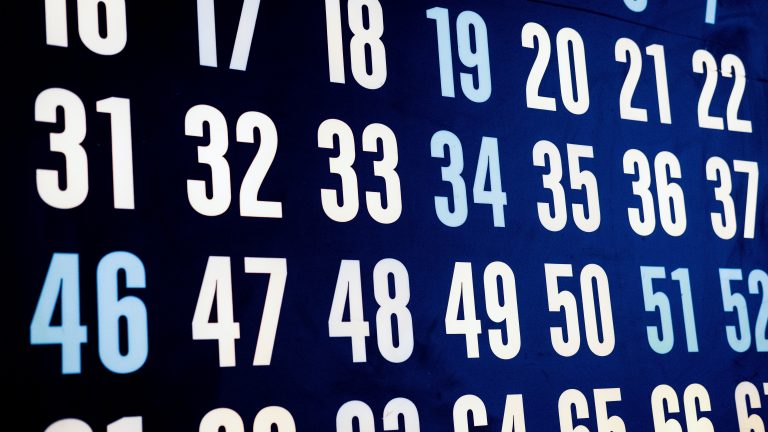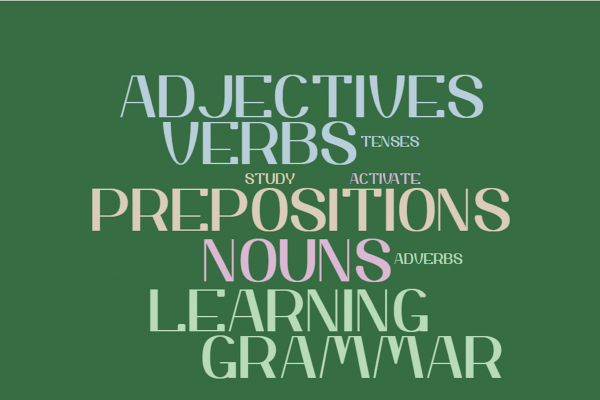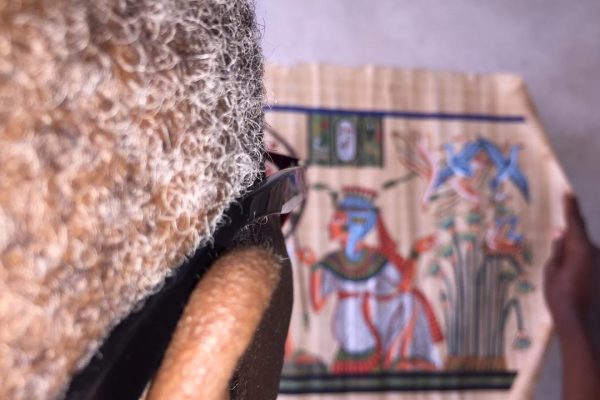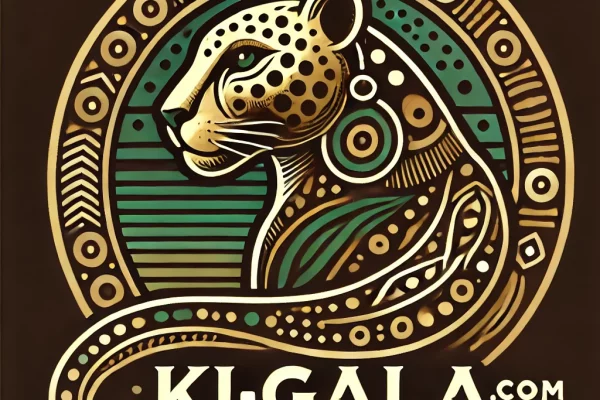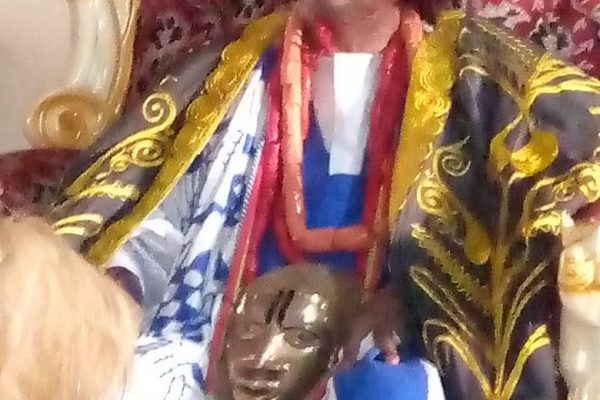Historical Background
Since the beginning of time, the Ígáláà have evolved a system of counting that stretches to large numbers beyond the imagination of the modern Igala youths and adults. Through this ancient system, Igala ancestors, who were predominantly farmers, were able to take record of their properties: the heaps they constructed in one day, the harvest of yam tubers, sacks of grains, and, of course, the cowries earned at the end of a market day. At home, they gratefully counted their blessing, saying: “Ọ́jọ́ agba-oo.” (God, I thank You).
Cowry Currency
The counting of cowry shells – (Cypraea moneta), ‘ẹ́yọ́-ọkọ́’ in Ígáláà – assisted our ancestors to digitize the ordering of counted items. Counting commences from a single unit (òké), leading to one ten (ẹ̀gwá), twenty (ógwú/ọ̀gbọ̀lọ̀ – shortened ‘ọ̀gbọ̀), fifty (óóje; ólí), hundred (ógwúẹ́lù), two hundred (ọ̀gwọ́kọ́), two hundred (íchámúù) and a thousand, (àdò or íchámú-nyí-ọ́gwọ́kọ́),as we’re going to see shortly.
As a legal tender in several parts of the world, cowries were obtained in abundant quantities from the Maldives Islands in Sri Lanka, South Asia.
Medieval African Market
The members of the British Expedition to the River Niger that visited Ídá in 1841, in its report, observed that: “Everything is conducted with the greatest order and with less noise titan one expects in an African market…Hundreds of men are to be seen counting their bags of cowries.”
Copper Bracelets
As generations rolled by, cowry shells ceased to be a means of exchange, replaced by brass or copper bracelets, called ‘Údẹ.’ The manila was used both as legal tender and as body ornament. For instance, important men wore ‘údẹ’ on the arm, while ladies wore them as bracelets and anklets. The term, ‘íkọ́bọ̀,’ which was used in the colonial period in Nigeria for one penny (1d) derived its name from ‘copper.’
The British Pound Sterling
When the British flag, the Union Jack, was hoisted in Nigeria on 1st January, 1900, it marked the change to a new administration. With it came a new currency, the Pound Sterling, which the British Empire introduced in its Nigerian colony.
The denominations of the British currency, as they were called in Igala language, are as follows:
(i) 1d (One penny) was called íkọ́bọ̀, while half a penny was called ‘Ógwúmẹ́lū), meaning ‘Twenty units in five places. (ii) 2d (Two pennies or two pence) was ‘íkọ́bọ̀ méjì. (Casual: ‘kọ́ọ̀ méjì). (iii) 3d (Three pence) was named ‘ítọ́lọ́’ (from ‘tọ́rọ́,’ as it was called elsewhere in Nigeria then. (iv) 6d (Six pence) was ‘íchíchì,’ from ‘sísí’ as it was called nationwide.
(v) 9d (Nine pence), which the natives called ‘ínányí,’ (nine). (vi) 12d (Twelve pence) was equal to ‘1s’ (One shilling), called ‘Òlìyá kāà.‘. (vii) 10s (Ten shillings) was called either ‘ọ́kọ́ mẹ́gwā’ or ‘òlìyá mẹ̄gwa.’
When the volume of trade increased worldwide, Cowry shells (Cypraea moneta), called ‘ẹ́yọ́-ọkọ́’ in Ígáláà, became the medium of exchange in many countries of the world. In medieval times, cowries were imported from the Maldives Islands in Sri Lanka, South Asia.
When the members of the British Expedition to the River Niger visited Ídá in 1841 A.D., they described the decorum with which trade was carried out, saying that “Everything is conducted with the greatest order and with less noise titan one expects in an African market…Hundreds of men are to be seen counting their bags of cowries.”
Cowries, as the years rolled by, gave way to brass/copper bracelets (Údẹ), which was used both as legal tender and as body ornament. For instance, important men wore ‘údẹ’ on the arm, while ladies wore them as bracelets and anklets.
British Pound Sterling
During the colonial period in Nigeria, the British Pound and shillings were introduced to the colonies of the British Empire in these denominations:
(i) 1d (One penny) was called íkọ́bọ̀ (derived from ‘copper’), while half a penny was called ‘Ógwúmẹ́lū), meaning ‘Twenty units in five places. (ii) 2d (Two pennies or two pence) was ‘íkọ́bọ̀ méjì. (Casual: ‘kọ́ọ̀ méjì). (iii) 3d (Three pence) was named ‘ítọ́lọ́’ (from ‘tọ́rọ́,’ as it was called elsewhere in Nigeria. (iv) 6d (Six pence) was ‘íchíchì,’ from ‘sísí’ as it was called nationwide.
(v) 9d (Nine pence), which the natives called ‘ínányí,’ (nine). (vi) 12d (Twelve pence) was equal to ‘1s’ (One shilling), called ‘Òlìyá kāà.’. (vii) 10s (Ten shillings) was called either ‘ọ́kọ́ mẹ́gwā’ or ‘òlìyá mẹ̄gwa.’ (viii) 20s (Twenty shillings), which was equal to £1 (One pound), was called ‘Ípámū kāà.’
(ix) £2 (Two pounds) was called ‘ípámú mējì,’ while £20 ̀was ‘Ípámū ogwú.’ (x) £10 (One hundred pounds) was called ‘Àkpúlùú káa.’
Cardinals
In mathematics, words used for counting are called cardinal numbers. In Ígáláà, counting begins with ‘Òké,’ (a single unit), as in Òké ‘káà/ mejì/mẹ́ta, etc. (One/two/three units). ‘Òké ‘káà,’ as a counting form, is collapsed to ‘òókáà.’ However, when counting things serially from the beginning, ‘Ényẹ́’ (One) is preferred; as in: Ényẹ́, èjì, ẹ̀ta, ẹ̀lẹ̀, ẹ̀lú, ẹ̀fà, èbie, ẹ̀jọ, ẹ̀lá, ẹ̀gwá. (One, two, three, four, five, six, seven, eight, nine, ten).
Ordinals
Words indicating order or sequence of occurrence are called ordinal numbers. Igala ordinals begin with ‘Òókáà’ or ‘Éjódùdu,’ (First), an adjective of number. In Igala speech, it is usually placed before a noun that it qualifies, E.g. ‘Ẹ́nẹ ejodùdu‘ (First person) or ‘Èyí ejodùdu’ (The first one). However, in English, the adjective comes after the noun. After the first number, the particle, ‘ẹ̀kẹ́,’ is adopted and prefixed to the numbers that come immediately after ‘Éjódùdu,’ as in ‘ẹ̀kejì’ (second), ẹ̀kẹ́ta (third) etc.
Cardinal Numbers
| English | Igala |
| One | Òókáà/Ényẹ́ |
| Two | Èjì |
| Three | Ẹ̀ta |
| Four | Ẹ̀lẹ̀ |
| Five | Ẹ̀lú |
| Six | Ẹ̀fà |
| Seven | Èbie |
| Eight | Ẹ̀jọ |
| Nine | Ẹ̀lá |
| Ten | Ẹ̀gwá |
| Eleven | Ẹ̀gwákáà |
| Twelve | Ẹ̀gwéjì |
| Thirteen | Ẹ̀gwẹ́ta |
| Fourteen | Ẹ̀gwẹ́lẹ̀ |
| Fifteen | Ẹ̀gwẹ́lū |
| Sixteen | Ẹ̀gwẹ́fà |
| Seventeen | Ẹ̀gwébie |
| Eighteen | Ẹ̀gwẹ́jọ |
| Nineteen | Ẹ̀gwẹ́lā |
| Tweenty | Ógwu |
Ordinal Numbers
| English | Igala |
| First | Éjódùdu |
| Second | Ẹ̀kéjì |
| Third | Ẹ̀kẹ́ta |
| Fourth | Ẹ̀kẹ́lẹ̀ |
| Fifth | Ẹ̀kẹ́lū |
| Sixth | Ẹ̀kẹ́fà |
| Seventh | Ẹ̀kébie |
| Eighth | Ẹ̀kéjọ |
| Ninth | Ẹ̀kẹ́lā |
| Tenth | Ẹ̀kẹ́gwā |
| Eleventh | Ẹ̀kẹ́gwākāà |
| Twelfth | Ẹ̀kẹ́gwējì |
| Thirteenth | Ẹ̀kẹ́gwẹ̄ta |
| Fourteenth | Ẹ̀kẹ́gwẹ̄lẹ̀ |
| Fifteenth | Ẹ̀kẹ́gwẹ̄lu |
| Sixteenth | Ẹ̀kẹ́gwẹ̄fà |
| Seventeenth | Ẹ̀kẹ́gwēbie |
| Eighteenth | Ẹ̀kẹ́gwẹ̄jọ |
| Nineteenth | Ẹ̀kẹ́gwẹ̄la |
| Twentieth | Ẹ̀kóogwú |
Cardinals Continued: 21 to 1,000,000,00 Twenty-one | Ógwú ny’ẹ́yọ́ kāà |
Twenty-two | Ógwú ny’ẹ́yọ́ méjì |
Twenty-four | Ógwú ny’ẹ́yọ́ mẹ́lẹ̀ |
| Twenty-five | Ógwú ny’ẹ́yọ́ mẹ́lū |
Twenty-six | Ógwú ny’ẹ́yọ́ mẹ́fà |
Twenty-seven | Ógwú ny’ẹ́yọ́ mébie |
Twenty-eight | Ógwú ny’ẹ́yọ́ mẹ́jọ |
Twenty-nine | Ógwú- ny’ẹ́yọ́ mẹ́lā |
| Thirty | Ógwú-ẹ́gwā |
Thirty-one | Ógwẹ́gwā ny’ẹ́yọ́ káà |
Thirty-five | Ógwẹ́gwā ny’ẹ́yọ́ mẹ́lū |
Thirty-nine | Ógwẹ́gwā ny’ẹ́yọ́ mẹ́lā |
Forty | Ọ̀gbọ̀méji |
Forty-one | Ọ̀gbọ̀méji ny’ẹ́yọ́ káà |
Forty-nine | Ọ̀gbọ̀méji ny’ẹ́yọ́ mẹ́lā |
| Fifty | Óóje |
Fifty-one | Óóje ny’ẹ́yọ́ káà |
| Fifty-nine | Óóje ny’ẹ́yọ́ mẹ́lā |
Sixty | Ọ̀gbọ̀mẹ́ta |
| Sixty-one | Ọ̀gbọ̀mẹ́ta ny’ẹ́yọ́ káà |
Sixty-nine | Ọ̀gbọ̀mẹ́ta ny’ẹ́yọ́ mẹ́lā |
| Seventy | Ẹ̀tẹẹ̀gwá |
Seventy-one | Ẹ̀tẹẹ̀gwá ny’ẹ́yọ́ káà |
Seventy-nine | Ẹ̀tẹẹ̀gwá ny’ẹ́yọ́ mẹ́lā |
Eighty | Ọ̀gbọ̀mẹ́lẹ̀ |
Eighty-one | Ọ̀gbọ̀mẹ́lẹ̀ ny’ẹ́yọ́ káà |
| Eighty-nine | Ọ̀gbọ̀mẹ́lẹ̀ ny’ẹ́yọ́ mẹ́lā |
Ninety | Ẹ̀lẹ̀ẹ̀gwá |
Ninety-nine | Ẹ̀lẹ̀ẹ̀gwā ny’ẹ́yọ́ mẹ́lā |
One hundred | Ógwúmẹ́lū |
| One hundred and one | Ógwúmẹ́lū ny’ẹ́yọ́ káà |
| One hundred and nine | Ógwúmẹ́lū ny’ẹ́yọ́ mẹ́lā |
| One hundred and twenty | Ógwúmẹ́lū ny’ẹ́yọ́ ogwú |
| Two hundred | Ọ̀gwọ́kọ́ |
Three hundred | Ólímẹ́fà |
| Four hundred | Úlú ọkọ́ |
| Five hundred | Ólí mẹ́gwā |
| Six hundred | Ólí mẹ́gwējì |
| Seven hundred | Ólí mẹ́gwẹ̄lẹ̀ |
| Eight hundred | Íchámúù |
| Nine hundred | Íchámú-ógwúmẹ́lū |
One thousand | Àdò ókáà OR Íchámú ny’ọ́gwọ̄kọ̄ |
Five hundred thousand | Àdò olímẹ́gwā |
| One million | Òdulugwu |
Two million | Òdulugwu méjì |
Two million, five hundred thousand | Òdulugwu méjì ny’ólímẹ́gwā |
One billion | Òdulugwu ugbo òdulugwu |
(Twenty shillings), which was equal to £1 (One pound), was called ‘Ípámū kāà.’
(ix) £2 (Two pounds) was called ‘ípámú mējì,’ while £20 ̀was ‘Ípámū ogwú.’ (x) £10 (One hundred pounds) was called ‘Àkpúlùú káa.’
Àlí Ọ̀chẹ́ja Ọ̀bàje’s Legacy
The penultimate Àtá-Igáláà, Dr. Álíyù Òtúlúkpé Ọ̀chẹ́ja Ọ̀baje (1956 – 2013), before joining his ancestors, advocated for a clean, unadulterated Igala counting system that would be rid of the intrusions of Hausa words.
Cardinals
In mathematics, words used for counting are called cardinal numbers. In Ígáláà, counting begins with ‘Òké,’ (a single unit), as in Òké ‘káà/ mejì/mẹ́ta, etc. (One/two/three units). ‘Òké ‘káà,’ as a counting form, is collapsed to ‘òókáà.’ However, when counting things serially from the beginning, ‘Ényẹ́’ (One) is preferred; as in: Ényẹ́, èjì, ẹ̀ta, ẹ̀lẹ̀, ẹ̀lú, ẹ̀fà, èbie, ẹ̀jọ, ẹ̀lá, ẹ̀gwá. (One, two, three, four, five, six, seven, eight, nine, ten).
Ordinals
Words indicating order or sequence of occurrence are called ordinal numbers. Igala ordinals begin with ‘Òókáà’ or ‘Éjódùdu,’ (First), an adjective of number. In Igala speech, it is usually placed before a noun that it qualifies, E.g. ‘Ẹ́nẹ ejodùdu‘ (First person) or ‘Èyí ejodùdu’ (The first one). However, in English, the adjective comes after the noun. After the first number, the particle, ‘ẹ̀kẹ́,’ is adopted and prefixed to the numbers that come immediately after ‘Éjódùdu,’ as in ‘ẹ̀kejì’ (second), ẹ̀kẹ́ta (third) etc.
Cardinal Numbers
| English | Igala |
| One | Òókáà/Ényẹ́ |
| Two | Èjì |
| Three | Ẹ̀ta |
| Four | Ẹ̀lẹ̀ |
| Five | Ẹ̀lú |
| Six | Ẹ̀fà |
| Seven | Èbie |
| Eight | Ẹ̀jọ |
| Nine | Ẹ̀lá |
| Ten | Ẹ̀gwá |
| Eleven | Ẹ̀gwákáà |
| Twelve | Ẹ̀gwéjì |
| Thirteen | Ẹ̀gwẹ́ta |
| Fourteen | Ẹ̀gwẹ́lẹ̀ |
| Fifteen | Ẹ̀gwẹ́lū |
| Sixteen | Ẹ̀gwẹ́fà |
| Seventeen | Ẹ̀gwébie |
| Eighteen | Ẹ̀gwẹ́jọ |
| Nineteen | Ẹ̀gwẹ́lā |
| Tweenty | Ógwu |
Ordinal Numbers
| English | Igala |
| First | Éjódùdu |
| Second | Ẹ̀kéjì |
| Third | Ẹ̀kẹ́ta |
| Fourth | Ẹ̀kẹ́lẹ̀ |
| Fifth | Ẹ̀kẹ́lū |
| Sixth | Ẹ̀kẹ́fà |
| Seventh | Ẹ̀kébie |
| Eighth | Ẹ̀kéjọ |
| Ninth | Ẹ̀kẹ́lā |
| Tenth | Ẹ̀kẹ́gwā |
| Eleventh | Ẹ̀kẹ́gwākāà |
| Twelfth | Ẹ̀kẹ́gwējì |
| Thirteenth | Ẹ̀kẹ́gwẹ̄ta |
| Fourteenth | Ẹ̀kẹ́gwẹ̄lẹ̀ |
| Fifteenth | Ẹ̀kẹ́gwẹ̄lu |
| Sixteenth | Ẹ̀kẹ́gwẹ̄fà |
| Seventeenth | Ẹ̀kẹ́gwēbie |
| Eighteenth | Ẹ̀kẹ́gwẹ̄jọ |
| Nineteenth | Ẹ̀kẹ́gwẹ̄la |
| Twentieth | Ẹ̀kóogwú |
Cardinals Continued: 21 to 1,000,000,00 Twenty-one | Ógwú ny’ẹ́yọ́ kāà |
Twenty-two | Ógwú ny’ẹ́yọ́ méjì |
Twenty-four |
Ógwú ny’ẹ́yọ́ mẹ́lẹ̀ |
| Twenty-five |
Ógwú ny’ẹ́yọ́ mẹ́lū |
Twenty-six |
Ógwú ny’ẹ́yọ́ mẹ́fà |
Twenty-seven | Ógwú ny’ẹ́yọ́ mébie |
Twenty-eight |
Ógwú ny’ẹ́yọ́ mẹ́jọ |
Twenty-nine |
Ógwú- ny’ẹ́yọ́ mẹ́lā |
| Thirty | Ógwú-ẹ́gwā |
Thirty-one |
Ógwẹ́gwā ny’ẹ́yọ́ káà |
Thirty-five |
Ógwẹ́gwā ny’ẹ́yọ́ mẹ́lū |
Thirty-nine |
Ógwẹ́gwā ny’ẹ́yọ́ mẹ́lā |
Forty | Ọ̀gbọ̀méji |
Forty-one | Ọ̀gbọ̀méji ny’ẹ́yọ́ káà |
Forty-nine |
Ọ̀gbọ̀méji ny’ẹ́yọ́ mẹ́lā |
| Fifty | Óóje |
Fifty-one |
Óóje ny’ẹ́yọ́ káà |
| Fifty-nine | Óóje ny’ẹ́yọ́ mẹ́lā |
Sixty | Ọ̀gbọ̀mẹ́ta |
| Sixty-one |
Ọ̀gbọ̀mẹ́ta ny’ẹ́yọ́ káà |
Sixty-nine |
Ọ̀gbọ̀mẹ́ta ny’ẹ́yọ́ mẹ́lā |
| Seventy | Ẹ̀tẹẹ̀gwá |
Seventy-one | Ẹ̀tẹẹ̀gwá ny’ẹ́yọ́ káà |
Seventy-nine |
Ẹ̀tẹẹ̀gwá ny’ẹ́yọ́ mẹ́lā |
Eighty | Ọ̀gbọ̀mẹ́lẹ̀ |
Eighty-one |
Ọ̀gbọ̀mẹ́lẹ̀ ny’ẹ́yọ́ káà |
| Eighty-nine |
Ọ̀gbọ̀mẹ́lẹ̀ ny’ẹ́yọ́ mẹ́lā |
Ninety | Ẹ̀lẹ̀ẹ̀gwá |
Ninety-nine |
Ẹ̀lẹ̀ẹ̀gwā ny’ẹ́yọ́ mẹ́lā |
One hundred | Ógwúmẹ́lū |
| One hundred and one |
Ógwúmẹ́lū ny’ẹ́yọ́ káà |
| One hundred and nine | Ógwúmẹ́lū ny’ẹ́yọ́ mẹ́lā |
| One hundred and twenty | Ógwúmẹ́lū ny’ẹ́yọ́ ogwú |
| Two hundred | Ọ̀gwọ́kọ́ |
Three hundred | Ólímẹ́fà |
| Four hundred | Úlú ọkọ́ |
| Five hundred | Ólí mẹ́gwā |
| Six hundred | Ólí mẹ́gwējì |
| Seven hundred | Ólí mẹ́gwẹ̄lẹ̀ |
| Eight hundred | Íchámúù |
| Nine hundred | Íchámú-ógwúmẹ́lū |
One thousand | Àdò ókáà OR Íchámú ny’ọ́gwọ̄kọ̄ |
Five hundred thousand | Àdò olímẹ́gwā |
| One million | Òdulugwu |
Two million | Òdulugwu méjì |
Two million, five hundred thousand | Òdulugwu méjì ny’ólímẹ́gwā |
One billion | Òdulugwu ugbo òdulugwu |





